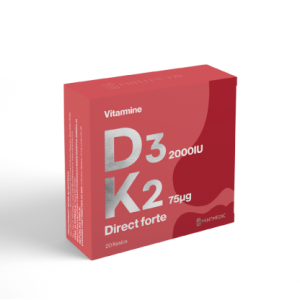METHOD OF APPLICATION
Method of application: Adults and children older than 12 years of age: 1 sachet per day. Slightly dissolve the contents of the bag in the mouth, without use of additional liquid.
The product is not intended for people who are hypersensitive to the ingredients of the product, nor for children under 12 years of age.
Notes: The recommended daily doses should not be exceeded! Dietary supplements cannot be used as a substitute for a varied and balanced diet.
Storage: Store in the original package, protected from light and moisture at a temperature up to 25° C
Net quantity: 40 g (20 bags)
COMPOSITION
Vitamin Fe + Lactoferrin Direct is a dietary supplement containing iron, folate, vitamin B12, vitamin C and lactoferrin. It contributes to the reduction of fatigue and exhaustion, maintain normal immune system function and normal energy metabolism, also possess antibacterial, antiviral, antifungal, anti-inflammatory, anti-oxidant and immune-stimulatory effect.
| Content of active components |
100g
|
1 bag (2g))
|
NRV (%) – Nutritional Reference Value
|
| Iron(iron(|||) – pyrophosphate) |
1g
|
20mg
|
143
|
| Folate (Calcium-L-methyl folate) |
20mg
|
400mg
|
200
|
| Vitamin C |
5g
|
100mg
|
125
|
| Vitamin B12 |
125µg
|
2,5µg
|
100
|
| Lactoferrin |
5g
|
100mg
|
/
|
NRV (%) – Nutritional Reference Value
Ingredients: bulking agent: dextrose; L-ascorbic acid; lactoferrin; raspberry aroma; iron (III) pyrophosphate; anticoagulant: magnesium stearate; sweetener: steviol glycosides; calcium L-methyl folate; methyl cobalamin.
MECHANISM OF ACTION
Iron –Iron(III) pyrophosphatecontributes to maintaining normal energy metabolism, functioning of normal immune system, normal cognitive function, reducing fatigue and exhaustion, production of normal red blood cell and hemoglobin, enables normal oxygen transport in the body, and has a role in the process of cell division.
Lactoferrin is a protein naturally present in mammalian milk, where it plays an important role in the metabolism of iron in newborns, and the proper formation and functioning of the immune system in the early stages of the newborn’s life. It has an extremely high iron content, so it is a very important factor in the transport of iron at the level of the small intestinal mucosa in people who have iron deficiency or increased iron needs.
Lactoferrin also has antibacterial, antiviral, antifungal, anti-inflammatory, antioxidant and immunomodulatory activity, which is why it has a beneficial effect on weakened immunity. It shows a significant effect in the condition of anemia, especially in pregnant women and women in their reproductive period, without the accompanying phenomena such as nausea, abdominal pain, constipation, dark stools and vomiting.
Vitamin B12 (methyl cobalamin) has a role in the process of cell division, maintains normal functioning of homocysteine, normal function of the immune system, helps in reduction of fatigue and exhaustion, maintains normal production of red blood cells and normal energy metabolism.
Vitamin C (L-ascorbic acid) in addition to its many functions, such as maintaining normal energy metabolism, normal immune system function, protecting cells from oxidative stress, reducing fatigue and exhaustion, has the most important function in this product because it increases iron absorption.
Folic acid (Calcium-L-5-methyl tetrahydrofolate) contributes to the normal function of the immune system, normal homocysteine metabolism, normal amino acid synthesis, growth of maternal tissue during pregnancy, reduction of fatigue and exhaustion, normal blood formation, and has a role in the process of cell division.
Additional intake of folic acid increases the level of folate in the mother. Low levels of folate in mothers present a risk factor for the development of neural tube damage in fetuses. The beneficial effect is achieved by daily intake of 400 µg of folic acid for at least one month before and three months after conception.





